New palliative care hospital brings ‘sweetness of Mary’ to poorest in Peru
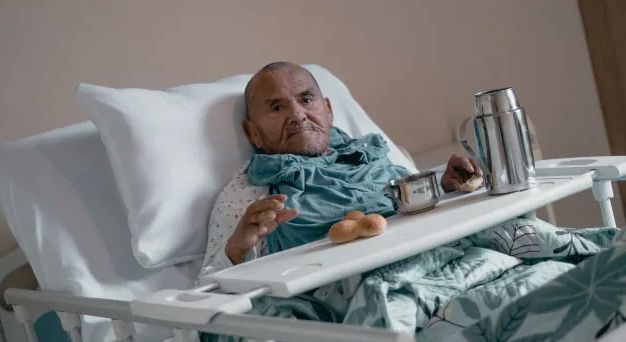
 A patient at the new Misky María Palliative Care Hospital located on the outskirts of Lima, Perú. / Credit: Asociación de las Bienaventuranzas (Association of the Beatitudes)
A patient at the new Misky María Palliative Care Hospital located on the outskirts of Lima, Perú. / Credit: Asociación de las Bienaventuranzas (Association of the Beatitudes) ACI Prensa Staff, May 4, 2024 / 08:00 am (CNA).
In the context of the recent news of the death of Ana Estrada, the first person to request and receive euthanasia in Peru, there is a contrasting story to tell on care for the dying in that country: that of a new Catholic hospital on the outskirts of Lima that provides palliative care, which extends the love of Christ to those in extreme poverty who are in the final stages of their lives.
The beginning of the ‘Misky María’ Hospital
In 2021, Father Omar Sánchez Portillo, a priest known for his extensive charitable work in the district of Lurín (south of Lima) and founder of the Association of the Beatitudes, had the dream of building a center to serve, with the “sweetness of Mary,” people in situations of abandonment and extreme poverty who have terminal illnesses. After much prayer, he shared the idea with a German Catholic friend and philanthropist.
“We thought about it, we meditated on it, and we always present our great projects as they begin, as a dream of the heart that we offer to God. They are our guides. So, we dreamed of this and presented the initial project, a small project, to serve 10 people,” Sánchez said in an interview with ACI Prensa, CNA’s Spanish-language news partner.
In a virtual meeting with Bishop Carlos García of the Diocese of Lurín, Peru, Sánchez and the bishop told the philanthropist about this dream.
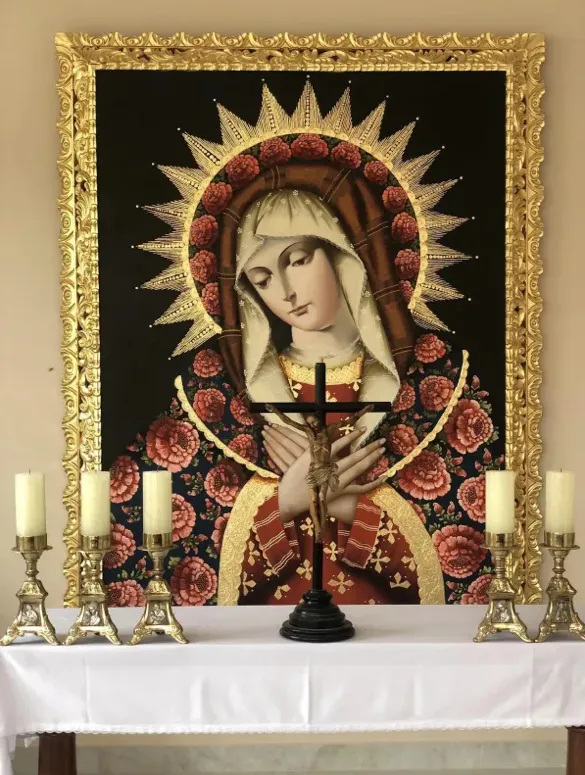
A painting of the Virgin Mary, dressed in a typical Peruvian, Cusco dress, adorned the meeting room. At one point, the German Catholic asked the bishop about the depiction of the Virgin. García responded that it was “Misky María,” which in the Indigenous Quechua means “Sweet Mary.”
Later, the German benefactor said: “That is going to be the perfect name for the palliative care hospital that I am going to give you, as a gift for the silver anniversary [25 years] of the Diocese of Lurín.” The bishop and priest, surprised, praised God and thanked the gentleman.
So it was that the hospital, with the capacity for 60 terminally ill patients, began to become a reality. It has an intensive care unit, palliative care, nursing, physical therapy, a kitchen, a chapel, and a funeral parlor. Care is provided free of charge and is provided by a multidisciplinary team of doctors, nurses, volunteers, and priests.
Construction began on Sept. 6, 2021, and the complex was inaugurated on Nov. 20, 2022. So far in their facilities, they have treated more than 100 patients who have already passed on. The hospital is currently treating 60 people with different types of terminal illnesses, such as cancer, AIDS, and other degenerative diseases.
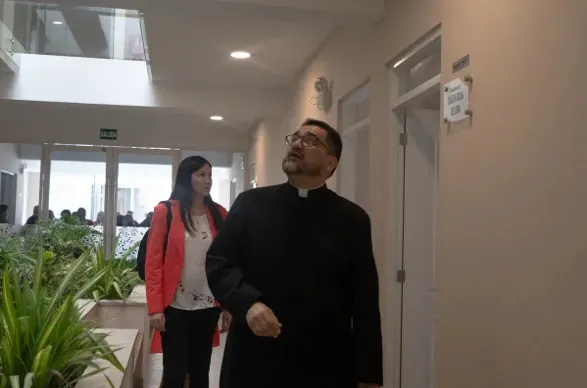
“The spirit of this work is to transmit the sweetness of Mary. I always tell the staff who work with me: ‘Imagine how Mary cared for Joseph in his last days, for her husband, St. Joseph, in his last days.’ That is why St. Joseph is the patron saint of a good death, because he was accompanied by Mary and Jesus. So, imagine that and that is the first attention we have to give them,” Sánchez explained to ACI Prensa.
According to the priest, “a truly dignified death is one that occurs in peace and, if possible, in communion with God.”
“As St. Francis said, we must receive sister death with open arms and without fear. This is what God asks of us: to perceive death as a companion that assists us on the journey toward life, preparing us for the last step toward meeting our full happiness, our eternal happiness,” he added.
“We cannot miss the opportunity to save souls,” Sánchez further emphasized.
The importance of a spiritual approach
Sánchez explained that when a patient arrives at the hospital, the staff first provides basic hygienic and medical care.
“Our first task is to serve [the patient],” he said. “We don’t talk to them about God or the future at that time. First, we assist them and notice how they open their hearts.”
“Those who can smile begin to do so, and for those who cannot communicate, we interpret their gestures, their gaze, and their smile as signs that they are feeling the love we give them,” he explained.
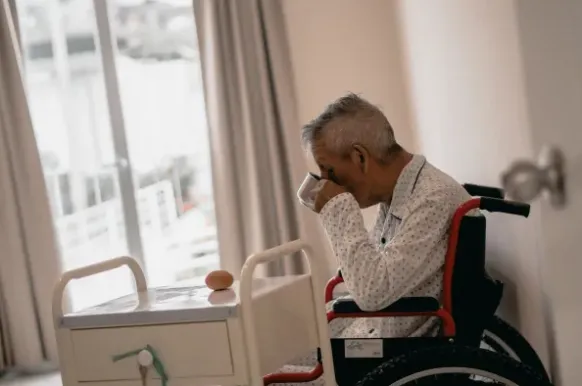
After the patient is stabilized, the volunteers sit to listen or talk, depending on the person’s ability. With those who can speak, a gradual conversation about faith is established. Some accept this process immediately, especially those who have had previous Catholic formation.
“Then comes the third part. They are asked if they are baptized. Many don’t know or don’t remember it. For those who do not have the ability to speak, we perform what the Church allows, known as conditional baptism. This guarantees the sacrament in case they are not sure if they have been baptized,” Sánchez continued.
Other sacraments are also administered. “No one is ever forced to receive them. For those who cannot make decisions for themselves, such as those who are unconscious, the sacraments are also given. It is considered that if the soul is open to receiving them, it constitutes an opportunity for salvation and eternal life,” the priest said.
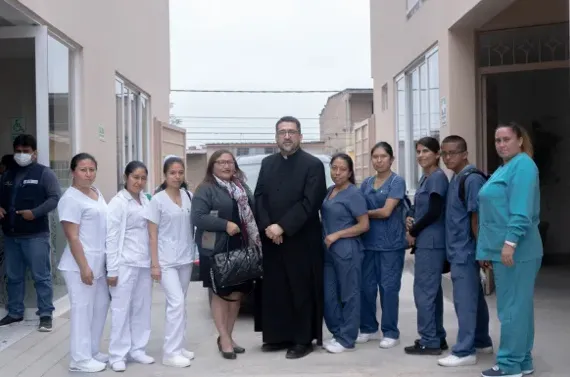
Stories that touch the heart
Sánchez also shared some of the most difficult, moving stories of abandonment of the people who have passed through the Misky María Hospital.
He told the story of one young man who was imprisoned for having stolen a cellphone and who was released three years later from the Lurigancho prison, one of the most violent prisons in Latin America, “with all the diseases you can imagine.”
“He essentially left to die with his family. However, this family, which was very poor, told him: ‘You can’t stay here, because we have no possibility of taking care of you.’ He left and ended up living in the garbage dump of a market in the south section of Lima. A group of friends looked for him and found him. They brought him to Misky María.
“He lived four days with us, days full of love and attention,” Sánchez continued.
Sánchez shared that of his own volition the young man was baptized and received Communion, confirmation, and extreme unction. “He received all the sacraments and died in my arms four days later,” the priest said. “That was a truly dignified death, a dignified death in every respect.”
Sánchez also shared the story of a heroic young Catholic priest, Father Juan, who died in the hospital at the age of 39 as a result of a severe infection of COVID-19, which he contracted during his apostolic service.
“He worked hard for the Church, but the time came when he was no longer able to do so. He went to the hospital and had 90% of his lungs affected. There was nothing to do. He remained in a vegetative state and only moved his eyes. For a time his diocese was able to help him, but then we received him and he died with us,” Sánchez said.
The priest also remembers a young homosexual man who studied fashion and lived a life of debauchery for many years. He contracted AIDS and his family expelled him from their home.
“He was a young man who could work as a model, who loved to dress well, but he ended up abandoned and taken care of by us. He received love until the last of his days,” Sánchez said.
A story that moved Sánchez to tears is that of Jeffrey, a child with a slight mental disability whom he described as a “saint.” The little boy died in Misky María due to pulmonary fibrosis.
According to the priest, in the last weeks of his life, the little boy told him: “Father, give my toys to the other children because I am leaving. I’m going to Jesus. There I am not going to need these toys.”
“This case moved me deeply. He was a child convinced of his holiness, wasn’t he?” Sánchez said.
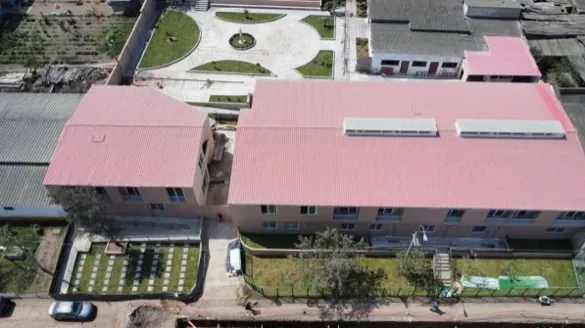
‘A caress from God for the poor’
Misky María Hospital is one of the works of the Association of the Beatitudes, an organization founded by Sánchez. The organization also currently serves 170 boys, girls, adolescents, young people, adults, and elderly who have been declared abandoned and who have various illnesses and needs.
When referring to the palliative care hospital, Sánchez recalled that “one way the Church has always had to help improve humanity is by filling in gaps and caring for the poorest, abandoned, and vulnerable.”
He also clarified that the charity does not charge money or establish conditions of any kind to receive people in the last stage of their lives. “Otherwise it would change the absolute meaning of the project that God placed in our hearts and that we are administering in his name,” he said.
However, he called on people to continue collaborating with the association’s multiple initiatives each year.
“Now you can understand why we sell panettone [sweet bread], why we have collection points to collect donations, why we look for godfathers and godmothers, why we constantly ask you for help for food, diapers, etc. Because only in this way can we continue to be a caress of God for the poor. Join us, help us, collaborate so we can continue making this world, our society, and our country better. God bless you,” Sánchez said.
This story was first published by ACI Prensa, CNA’s Spanish-language news partner. It has been translated and adapted by CNA.





